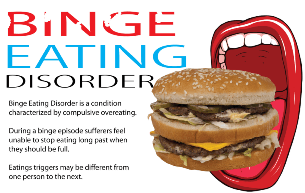Many people overeat sometimes e.g. during the holidays but it is not the same thing as binge eating disorder. A person with binge eating disorder has the following symptoms weekly for at least 3 weeks: frequent episodes of eating what others would consider an abnormally large amount of food, frequent feelings of being unable to control what or how much is being eaten, eating much more rapidly than usual, eating until uncomfortably full, eating large amounts of food, even when not physically hungry, eating alone out of embarrassment at the quantity of food being eaten, feelings of disgust, depression, or guilt after overeating. This disorder is slightly more common in women than in men. It causes: high blood pressure, obesity, cardiovascular disease, diabetes, sleep problems, high cholesterol, and sometimes limited mobility from being overweight.
People with binge eating disorder usually have: fluctuations in weight, feelings of low self-esteem, loss of sexual desire, and frequent dieting. Treatment include: group and/or family therapy, medication such as antidepressants to help treat or control the depression which possibly causes the binge eating disorder, nutrition counseling and, psychotherapy to change the thinking or behavior of the person with the disorder.
I am blogging about this disorder because though very common, people tend to focus more on bulimia nervosa and anorexia nervosa. If you know anyone with binge eating disorder, be kind to them and help them get treatment. If you suffer or suffered from binge eating disorder, share your story with us to help encourage others.
Source: Web MD

No comments:
Post a Comment